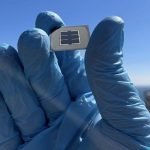Scientists invented an entirely new way to make solar cells
Holes help make sponges and English muffins useful (and, in the case of the latter, delicious).
Without holes, they wouldn’t be flexible enough to bend...
Scientists find the best sites for electric vehicle charging stations
Researchers from North Carolina State University have developed a computational model that can be used to determine the optimal places for locating electric vehicle...
MIT fuel cell could use the body’s own sugar to generate electricity
Glucose is the sugar we absorb from the foods we eat.
It is the fuel that powers every cell in our bodies. Could glucose also...
Scientists find the factors behind rechargeable battery decay
Rechargeable lithium-ion batteries don't last forever.
After enough cycles of charging and recharging, they'll eventually go kaput, so researchers are constantly looking for ways to...
Lunar soil could generate oxygen and fuel, shows study
Soil on the moon contains active compounds that can convert carbon dioxide into oxygen and fuels, scientists in China report in the journal Joule.
They...
New tandem solar cells deliver record efficiency of 29.2%
EPFL scientists in Neuchâtel have developed a tandem solar cell that can deliver a certified efficiency of 29.2%.
This achievement was made possible by combining...
Elon Musk: Why Tesla builds gigantic battery factories
Tesla’s mission is to accelerate the world’s transition to sustainable energy through increasingly affordable electric vehicles and energy products.
To ramp production to 500,000 cars...
Most California incentive programs meant to reduce energy use have the opposite effect, shows...
The state of California spends about $1 billion per year on programs that subsidize the installation of energy-efficient appliances, from lightbulbs to whole-house retrofits.
But...
Elon Musk: My view about Tesla competitors in the self-driving car market
The automotive industry is witnessing a rapid evolution of safety features, which is expected to increase exponentially in the coming years to provide a...
Reversible fuel cells could offer cheap energy storage
A major challenge for producers of electricity from solar panels and wind turbines is akin to capturing lightning in a bottle.
Both solar and wind...










